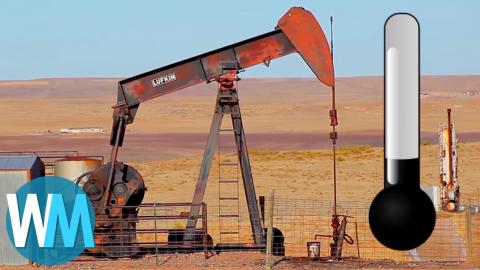Top 10 Things the World is Running Low On

These resources might not be around for much longer. Be it tequila, sardines, or even coffee, the world is definitely running out of some important things. WatchMojo counts down the top 10 things the world is running dangerously low on.
Special thanks to our user MikeMJPMUNCH for suggesting this idea! Check out the voting page at http://WatchMojo.comsuggest/Top+Ten+Things+The+World+Is+Running+Low+On
Script written by Michael Wynands
#10: Goat Cheese
Don’t panic. Goat cheese is still widely available… but that could change. We’ve seen a global increase in goat dairy as people have moved away for cow milk for dietary and digestive reasons. But unfortunately, this ill-timed trend took off in tandem with a fall in the production of goat milk after a massive amount of goats and sheep were hit with disease in 2010. This meant that many farmers have left the industry for financial reasons. Hopefully the increased demand will bring back producers, but we should all be prepared to pay a bit more for our goat cheese, or bid “adieu” to this lovely wine pairing.
#9: Tequila
Unfortunately, that lovely Mexican beverage responsible for so many great nights and absolutely terrible mornings, is at-risk too. Once again, it comes back to the farmers, finance and disease. Tequila is made from the blue agave plant, which requires about twelve years of growth before it can yield the goods to produce tequila. That’s a long time to wait, especially when farmers could be using their land for a more lucrative cash crop - corn. Farmers are doing just that to make up for the 1/5 of the plants destroyed by disease in 2007 – and although there may still be plenty of tequila to go around right now… you may want to stock up.
#8: Sardines
For fans of this salty little fish, either on pizza or in Caesar salad… you might be in trouble. While the tequila and goat cheese industries can easily be recovered, the sardine situation might be sunk.. As with many other types of fish, overfishing is a major factor, but with sardines… giving them a break to repopulate isn’t cutting it. The population has continued to plummet despite the imposition of some limits, which have led many to suspect environmental factors.
#7: Bacon
Bacon Beatdown, Selfie Security and Ganga Leveraging Girl Scouts: The Dispatch Episode 15
You've likely already felt the effects of this particular pork deficiency - as supermarket bacon prices have skyrocketed in the 2010s. In 2012, Britain’s National Pig Association called a global shortage “unavoidable,” and we’ve been living it ever since. Pigs raised within the industrial farming system are highly susceptible to illness, most notably the horrific-sounding Porcine Epidemic Diarrhea Virus, which resulted in the culling of 8 million pigs since 2014. Poor harvests and drought in other pig-raising areas of the world only made it worse. Thankfully, according to the USDA, 2016 was a record comeback year for the U.S. pork industry, but China, another major producer, is now facing shortages.
#6: Coffee
Forget all those dystopian movies. It’s not going to be zombies, nuclear fallout or evil mega-corporations that usher in the apocalypse - it will be a lack of coffee. Without it, we wouldn’t be surprised if about 50% of people would just give up and die, effectively bringing the wheels of civilization to a grinding halt. Many of the largest coffee producing countries have been experiencing terrible droughts and infected crops in the 2010s. With climate change, it has been estimated that half of all potential coffee-growing land will become unusable by 2050. Considering the fact that humanity consumes roughly 2.25 billion cups of coffee each day… we’re in for one hell of a collective caffeine withdrawal headache.
#5: Honey
Oh, the sweet sting of karma. For thousands of years, we’ve been living off the labor of bees, depending on them to produce that sweet sticky for free. All they asked for in return was a suitable habitat, pollen to collect and enough honey to survive. And we blew it! A lack of crop diversity, climate change, pesticide use - no one’s sure what the exact cause is, but in the United States, bees are dropping like flies. And if it continues, the ripple effect will be devastating. Bees pollinate over 100 different crops, including almonds, apples, and more. Without bees - these crops fail. Many will not realise just how much bees did for them until they’re gone.
#4: Helium
High-pitched voices aside… this is no laughing matter. While the average consumer thinks of helium as little more than a novelty gas to help lift spirits and balloons at a party, it serves a crucial role in various industries including welding, rocketry, manufacturing and medicine. Currently, the U.S. supplies 75% of the world’s helium, half of which comes from U.S. Federal Helium Reserve in Amarillo, Texas. But the government-mandated lifespan of this reserve is nearly at an end, and sure enough… the reservoir is almost depleted. It was always assumed that private companies would pick up the slack, but nowhere near enough plants have opened to make up the difference. On top of that, the helium we’ll have to get from the air will be thousands of times more expensive.
#3: Cocoa
In a world of diverse culinary tastes, chocolate seems to be a universal hit, and the global demand keeps growing. Weather conditions and disease have hurt production, and much of the world’s supply is produced by subsistence farmers using the same techniques they’ve been using for generations…and they can’t keep up. While much of the world adores chocolate, most cocoa farmers don’t feel the love. It’s hard work with little reward. According to the Cocoa Barometer, cocoa farmers in Ghana make roughly 84 cents a day, which has younger generations in farming families looking for better opportunities in other fields – meaning chocolate prices will likely go up quite a bit.
#2: Oil / Petroleum
Top 10 Things You Didn't Know About the Bombings of Hiroshima and Nagasaki
Yeah yeah… we know. Everyone has been talking about “peak oil” or running out of fossil fuels for decades, but every time you go to the pump, there’s enough to fill your car. So what’s the problem? Petroleum is a nonrenewable resource… we can’t just crush up plant and animal matter, cook it on high for 30 minutes and call it “crisis averted.” Oil takes hundreds of thousands, if not millions of years to form. No one can agree on whenexactly we’ll run out, but according to many scientists, we’re already seeing signs of depletion. The U.S. is currently importing 60% of its oil. What happens when everyone starts running low? Time to start investing in solar?
Before we unveil our top pick, here are a few honorable mentions.
Bananas
Gold
#1: Fresh Water
Let’s be honest… if we run out of this life-giving liquid, the availability of everything else on this list becomes moot. We’re dead. And while many people in the western world think of water as free and unlimited, it’s that very sort of thinking that has the world driving full speed at a brick wall called “extinction.” Only 2.6% to 4% of the water on earth is fresh. The U.N. has already reported water shortages on every continent and is predicting that by 2025, 1.8 billion humans will be living in areas with issues of water scarcity. Experts are urging people to start using water responsibly - our very survival may depend on it.



